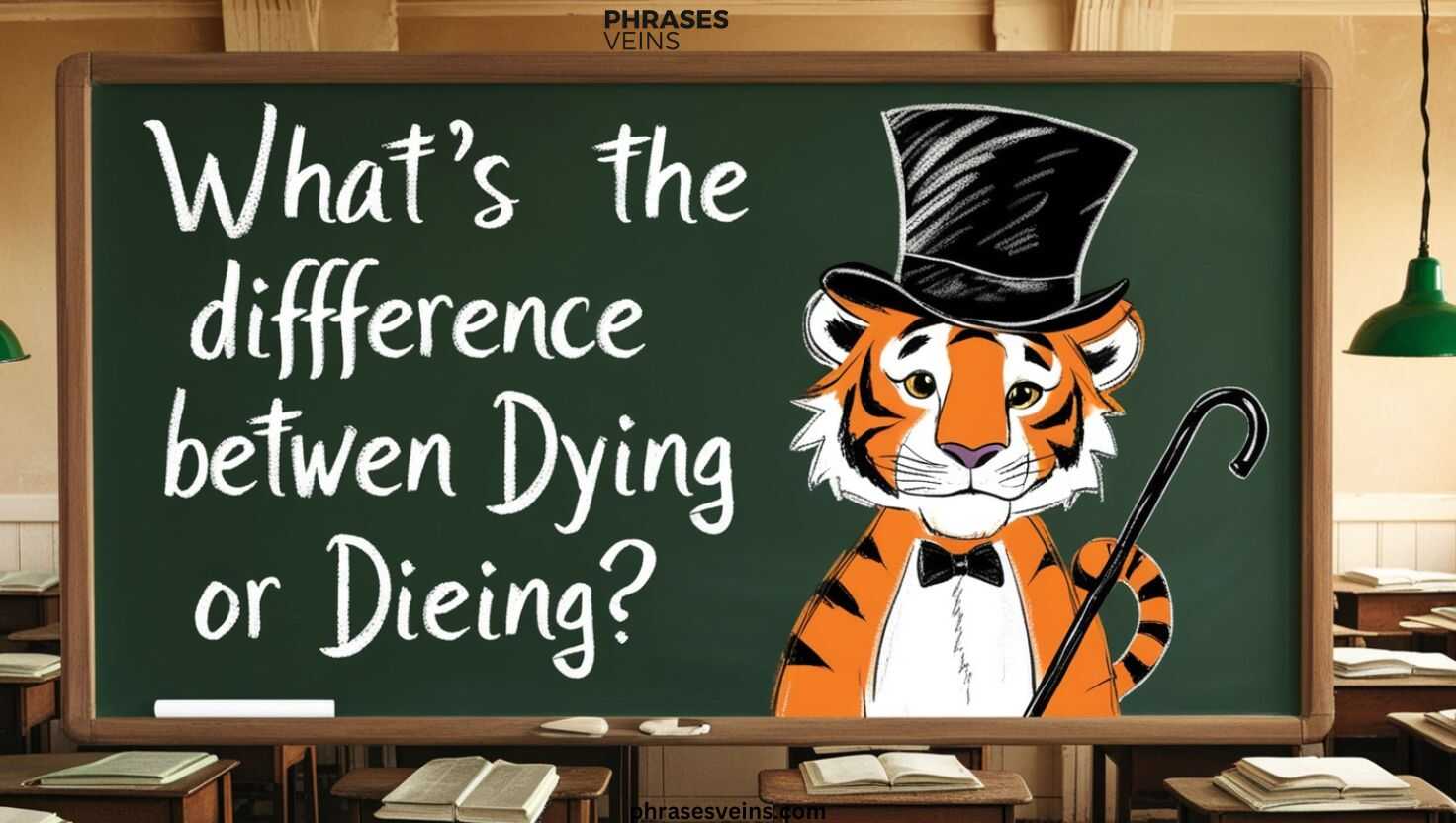If you’re ever confused about the difference between “dying” and “dieing,” you’re not alone. Many people mix up these words, especially since they sound so similar and have related meanings. While they may seem interchangeable, one of these terms is actually incorrect in modern usage. The distinction between dying and dieing is important for clear, accurate communication. Let’s dive into the dieing vs dying debate, clear up the confusion, and get a better understanding of both terms.
Understanding the correct spelling and usage of these words is key to improving your writing. Whether you’re writing about life and death, the functioning of a machine, or even using hyperbolic expressions in daily conversation, knowing when to use dying and when dieing might come in handy.
In this article, we’ll break down the meaning, history, and usage of both words, and provide some helpful tips to avoid common spelling mistakes. By the end, you’ll have a clearer understanding of the present participle form and when to use the word correctly.
“Dieing” vs “Dying”
The main difference between “dieing” and “dying” is that dying is the correct spelling. It is the proper form of the verb, meaning the process of ceasing to live. However, dieing is an outdated and incorrect spelling. Spelling confusion can happen when people mix these up, especially in fast writing or when not paying close attention.
Many learners get this wrong because they don’t know that dieing is actually a verb form used rarely in the past. Correct spelling rules in English state that dying is the present participle of “to die.” Remember, present participle spelling follows specific grammar rules. So, next time you write, make sure to use dying!
Dying or Dieing: Which Is Correct?
When choosing between dieing vs dying, always choose dying. It’s the form you will see in most books, articles, and other written content. Grammar checker tools can catch this mistake if you’re unsure. In almost all cases, dying is the right word, especially in formal and academic writing.
In some rare cases, you may come across dieing in older literature or poetry. It is important to remember that it is no longer considered the correct spelling. So when in doubt, stick with dying.
What Does “Dying” Mean?
Dying is used to describe the process of ceasing to live. It refers to the act of approaching death or the state of being near death. For example, the sentence “He’s been dying from the disease for weeks” is an accurate way to use the word.
But dying can also be used figuratively. When someone says, “I’m dying for a coffee,” they are not literally dying, but exaggerating how badly they want one. This is a hyperbolic use of to die to emphasize desire. The dying adjective meaning can shift based on the context!
Please Keep in Mind
It’s essential to keep in mind that the only proper spelling is dying when referring to death or desire. Dieing should be avoided unless you are reading something from an older time or specific poetic writing. If you accidentally use the wrong one, it’s easy to confuse your readers.
Always double-check your writing, especially when discussing sensitive topics like life and death. Using the right word is important. A simple spelling mistake example could make your writing seem less polished.
What Does “Dieing” Mean?
As mentioned, dieing is a rare and incorrect form of “dying.” It’s an old-fashioned version that was used in English grammar, but it’s hardly ever seen today. The dieing definition is the same as “dying,” but it’s now considered a mistake in modern writing.
There is no reason to use dieing when writing today. So next time, when you’re about to write, think about the present participle spelling. Use dying to make sure your message is clear and correct.
What About “Dyeing”?
Let’s not confuse dying with dyeing! While dying refers to the end of life, dyeing is the process of changing the color of something, like fabric or hair. You might say, “She’s dyeing her hair blue.” This is an entirely different concept from death!
You may come across spelling vs definition mistakes when people confuse these two words. To keep things clear, always remember the distinction. One is about life, and the other is about color.
READ MORE >>> Gasses or Gases – Which Is the Correct Plural? 👍
Are You “Dying” for Your Writing to Be Flawless?
If you’re aiming for perfect writing, avoid errors like dying vs dieing. Even small mistakes can distract readers from your main points. So, check your work carefully and use grammar checker tools to catch any errors, especially with tricky words like these.
When you write, think about how you can improve clarity. Focus on the basics, like spelling and grammar, to make your writing as strong as possible.
When to Use This Word?
You should use dying when talking about death or a process that leads to death. For example, “The plant is dying because it hasn’t been watered.” Similarly, dying is used in idiomatic expressions like “dying for a pizza.” But avoid using dieing, as it’s incorrect in modern grammar.
The best time to use dying is when describing life’s natural end or a dramatic desire. Avoid confusion by always checking the context of your sentence.
Proper Use for This?
The proper use for dying is in the context of both literal and metaphorical death. For example, “The machine stops working because it’s dying” refers to something no longer functioning. However, don’t say “The machine is dieing,” as that’s a spelling mistake and doesn’t follow modern English grammar rules.
Also, remember, dying can be used figuratively. If someone says, “I’m dying to meet the new CEO,” they are simply emphasizing excitement, not death.
History of This Word
The word dying has roots in Old English, where it was originally used in various forms. Over time, the spelling evolved to dying, which is now the standard in modern English. The historical form dieing was once acceptable, but language evolves, and this spelling has fallen out of favor.
Understanding the verbs in English grammar and how they change can help you avoid mistakes like this. English is full of surprises, but sticking with dying will help keep your writing current.
Common Mistake to Avoid
The most common mistake people make is confusing dying with dieing. Many think dieing is correct, but it’s an outdated spelling. So, always double-check your writing to avoid this spelling mistake example. Using dying correctly will make your writing sound polished and professional.
The key takeaway? Dieing is simply wrong, and dying is the word to use in almost all situations.
Frequently Asked Questions
Which is correct, dieing or dying?
The correct spelling is dying. Dieing is an outdated and incorrect form of the word. Dying is the proper spelling when referring to the process of death, the gradual loss of function, or a strong, figurative desire.
What is the meaning of dieing?
Dieing is a spelling mistake. It’s not recognized in modern English grammar rules. The proper term is dying, which refers to the act of ceasing to live or the process of something losing its function. For example, “The plant is dying from lack of water.”
Is it dying or dyeing my hair?
When referring to changing the color of your hair, the correct spelling is dyeing. Dyeing refers to the act of coloring something with a dye, such as hair or fabric. For example, “I’m dyeing my hair purple this weekend.”
Is it tie dyeing or dyeing?
The correct term is tie-dyeing. This refers to the technique of tying fabric and then dyeing it to create a colorful pattern. For example, “We spent the afternoon tie-dyeing T-shirts for the festival.”
Conclusion
In conclusion, the correct spelling is always dying. Whether you’re talking about the end of life, an object losing its function, or a figurative expression of desire, dying is the proper choice. It’s important to avoid using dieing, as it’s an outdated and incorrect spelling. Misusing it can not only confuse your readers but also undermine your writing’s credibility. To ensure your writing is clear, accurate, and professional, always opt for dying when referring to death, the loss of function, or exaggerating a strong desire.
By mastering the use of dying, you’ll improve the quality of your writing and make sure you stay on top of modern English grammar rules. Double-check your work and remember that correct spelling is key to communicating your message effectively. So next time you write about life’s end or even an intense longing, confidently choose dying over dieing you’ll be on the path to flawless, polished writing!

Welcome to PhrasesVeins, where Arabella Reed brings language to life. With a passion for grammar and phrases, Arabella offers unique insights to help you master language and enhance your expression. Whether you’re a language enthusiast or looking to improve your skills, Arabella’s work guides you through the beauty of words.

